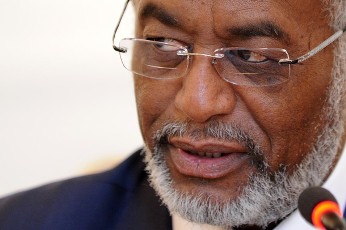Sudan FM says no talks with south before addressing security issues
May 4, 2012 (KHARTOUM) – The Sudanese foreign minister Ali Karti ruled out any talks with South Sudan unless the security item is top on the agenda of negotiations.

Any party that fails to comply could be subject to sanctions under Article 41 of the UN charter, according to the text of the UNSC decision.
While South Sudan accepted the resolution, Sudanese officials reacted cautiously and emphasised only the positive elements contained in it.
Khartoum has been critical of the AU for asking the UNSC to intervene calling it an attempt to override the African role in resolving the north-south dispute.
In a radio interview today, Karti said that it is pointless to discuss borders, trade, and oil while South Sudan continues to back Sudanese rebels fighting the army in border states seeking to oust the government in Khartoum.
Sudan’s top diplomat also said that with the exception of Abyei, the army will not withdraw from the disputed border areas arguing that the UNSC resolution does not make that a requirement.
The UNSC resolution orders the two sides to immediately withdraw their forces inside their respective borders without conditions and within a week activate the Joint Border Verification and Monitoring Mechanism (JBVMM) and the Safe Demilitarized Border Zone (SDBZ).
Karti criticised those in the country calling for rejecting the UNSC resolution suggesting that they will get the country into trouble.
He listed the pros of the resolution including condemnation of Juba’s brief occupation of Heglig, calling for a fact-finding mission to assess damage done to oil facilities in the region.
The country’s ruling National Congress Party (NCP) has slammed the resolution saying that it punishes Sudan and rewards the aggressor in reference to Heglig’s takeover.
The Sudanese foreign minister also stressed that South Sudan has no viable option in the short term to export its oil except through the north’s pipelines.
Sudan, which was Africa’s largest country before the South gained independence in July, sits atop some of the continent’s most significant oil resources.
But it lost three-quarters of the oil after Juba’s seceded under a 2005 settlement that ended two decades of civil war between north and south. The pipelines to export the oil run through the north, however, and a dispute about how the oil wealth should be divided has stoked fears of war.
The conflict has brought nearly all oil production to a standstill, damaging both countries’ struggling economies.
(ST)
